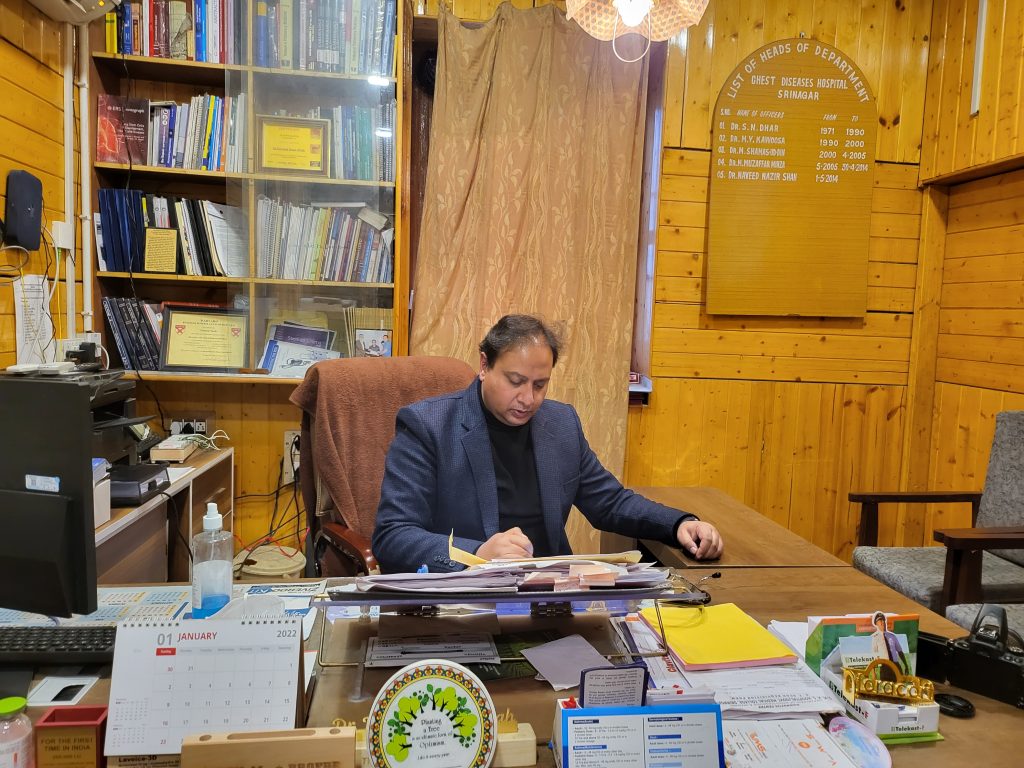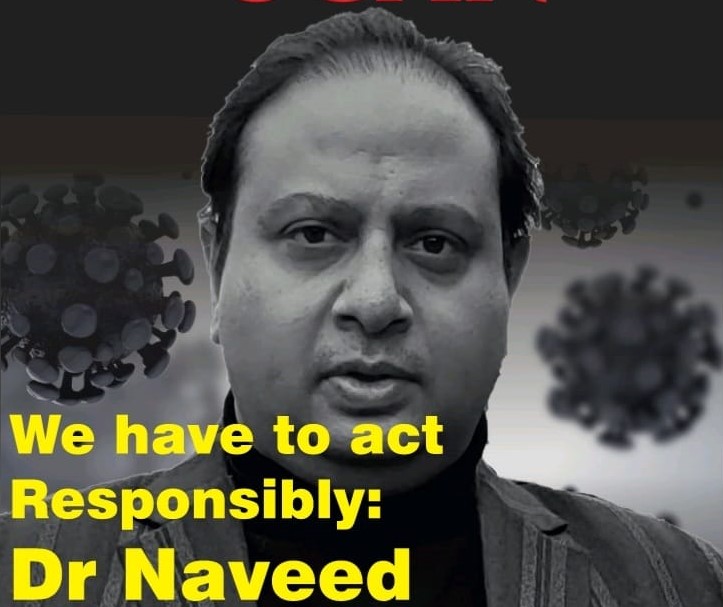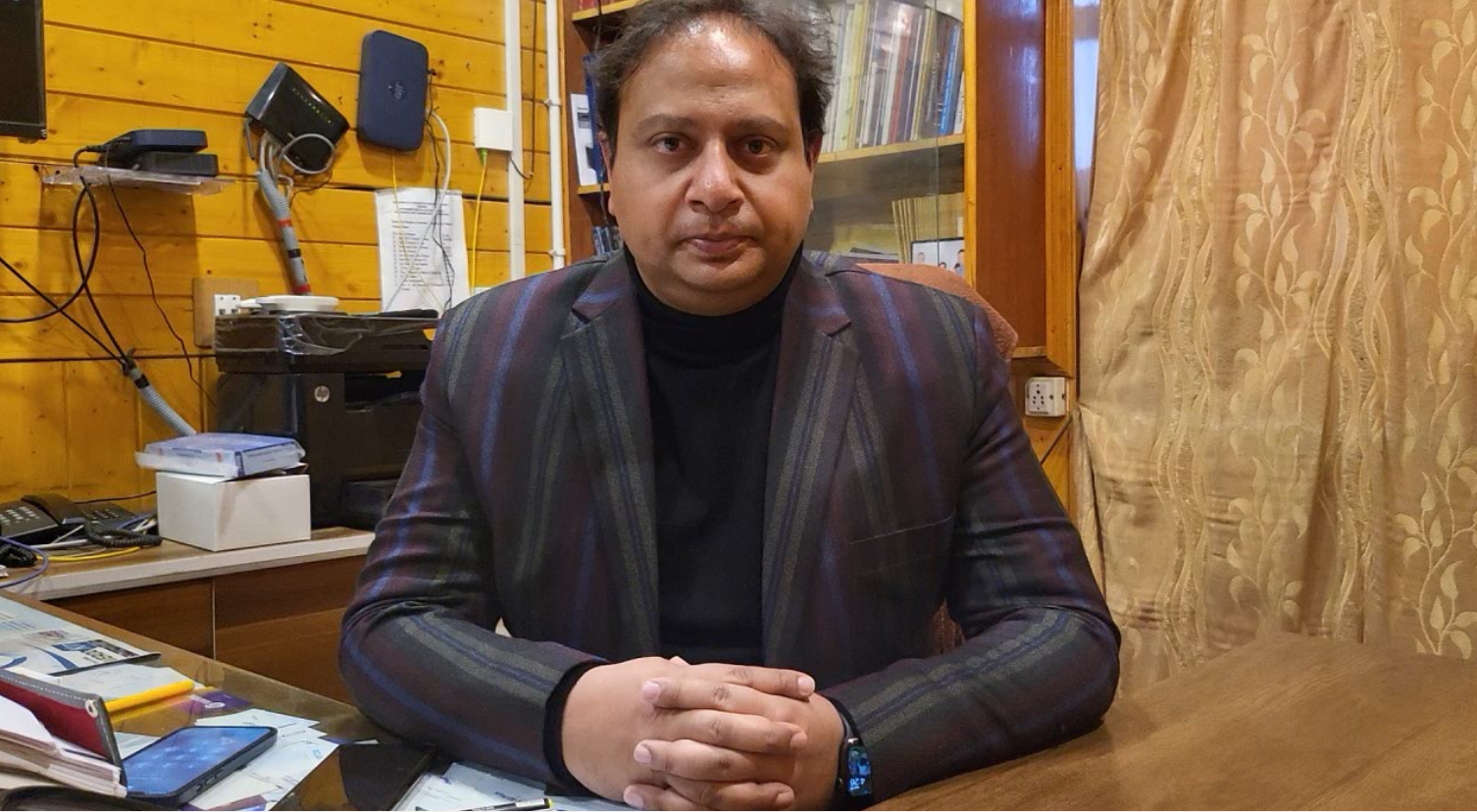The Covid-19 has reared its ugly head. The onset of the third wave has been marked in J&K by the return of the weekend lockdown and night curfew. Kashmir Scan spoke with Dr Naveed Nazir Shah, who has been at the forefront of the fight against Covid-19, to dispel some myths about the virus.
By Ajaz Rashid
Kashmir Scan. You have been assigned the leading role of COVID management since day one of the pandemic. How was this experience, and what challenges have you faced so far? We have to act responsibly: Dr Naveed
Dr Naveed: When the COVID-19 started around March 2020, the government planned to designate different hospitals exclusively as COVID hospitals. Being a respiratory disease expert, I along with my team took up the challenge voluntarily and subsequently the Chest Disease Hospital in Srinagar was designated as an exclusive hospital for COVID treatment.
It was a new and challenging experience for all of us because when the pandemic started, the disease was unknown so was its treatment. At that point in time all the infected patients, whether symptomatic or asymptomatic, were hospitalised. Until that time, we were used to treating the patients inside the hospital who were sick with any respiratory ailment and needed the treatment. But now, we were facing a situation where most of the patients were asymptomatic or had mild symptoms. Such patients needed family care than any treatment. The patients admitted at that time were astonished as to why they were being kept as hostages inside the hospitals. Instead of demanding the treatment, they demanded the luxuries of life, and in fact, we were looking after their basic day to day needs. We were working in a scary atmosphere because everybody considered getting infected like a death sentence and nobody wanted to come forth to treat these patients. Even most of the families and friends of the COVID-positive patients deserted them. We were taking care of each and every basic need of the patients from a simple toothbrush, towels and soaps to everyday food. We were constantly counselling the patients regarding why they were being kept inside the hospitals and giving them hope that everything would be alright.
KS: What was your reaction towards a new disease like the novel Coronavirus?
DN: Like other doctors globally, COVID-19 was an alien disease to treat for the doctors here in Kashmir. The same was the case with us. It was a new experience for me as well to treat Coronavirus infected patients. We were treating a new disease in a new manner. We were working in a chaotic atmosphere, but subsequently, when the policy of hospitals of isolation was taken off, and home isolation was started, we came back to the normal procedure of treating symptomatic patients who needed treatment, oxygen, medicines etc.
KS: What was the primary treatment you were prescribing to the COVID patients?
DN: Since COVID-19 was a new disease worldwide and nobody knew its definite treatment, all the doctors used to prescribe the experimental treatments to the patients. Even after two years of the pandemic, nobody still knows the actual treatment for COVID-19. It was all about the experimental therapies and the drugs which were given emergency usage authorisation by the regularity authorities, and we were also following the same protocol. During this period in addition to treatment lot of research was conducted too which has been published in reputed national and international journals.
During this period there was a constant up-gradation of the hospitals in the country. Even our CD Hospital was also upgraded with new oxygen plants, ventilators high flow machines and sophisticated testing labs. The results of upgrades are quite apparent. We have the lowest mortality rate among all the hospitals in the Union Territory of J&K and even at the national level.

KS: What is the Omicron variant of COVID-19?
DN: The new variant of Coronavirus first discovered in South Africa in November 2021 was named OMICRON. Omicron started from South Africa, has now travelled in all the countries of the continent. This mutant has most of the mutations in the spike protein. Though this variant has till now shown to cause milder diseases but the transmissibility/infectivity is very high. The peculiar thing about this virus is that it has many mutations in the spike protein against which almost all the vaccines form the antibodies which may render the vaccines ineffective.
KS: Could this variant be as severe as the Delta variant in terms of hospitalisation and casualties?
DN: The severity of Omicron is less than the previous Corona variants in terms of hospitalisation and casualties. The available data suggests that the percentage of the patients who were infected with the Delta variant around 20 to 25 per cent of such patients got admitted in the hospitals. In comparison, only five to 10 per cent of the patients affected with Omicron are getting admitted. But transmissibility of the Omicron variant is very high around 4to 5 times of the previous variant. Omicron can affect huge numbers because of its high transmissibility. So we have to be extremely cautious.
“At the onset of first wave, doctors were taking care of each and every basic need of the patients. From a simple toothbrush, towels and soaps to everyday food, we were taking care of everything”
KS: Based on the available data, are there any particular precautions to be taken by the general public?
DN: We need to be extra cautious and follow all COVID protocols, including using face masks, hand sanitisers, avoiding social gatherings as much as possible and maintaining social distance. Following the COVID-19 protocol is the only way by which we can reduce the pace of transmission of the COVID infection.
Another important thing to be followed is COVID vaccination. The vaccination has already started for the kids above the age of 15 years, frontline healthcare workers and those with comorbidities, so it has been suggested that whosoever have taken their last vaccine dose nine months ago should come forth to take the precautionary dose to amplify their immune system. Those who are yet to take the first/second dose should take it without fail.
KS: As an expert on the subject, what is your advice about conducting political gatherings, religious gatherings and official gatherings?
DN: Social gathering in any form has to be avoided be it political, religious or official. We have to try to switch to the online mode if any necessary meeting has to be conducted. The SOPs have to be followed in letter and spirit.
KS: What is your take on the efficacy of the drug recently introduced by Dr Reddy’s company to deal with the Omicron variant.
DN: It has been around two years that we have been in this pandemic. To date, we don’t have any definite treatment for COVID-19. Multiple drugs are being given emergency authorisation usage by the Drug Controller authorities. These are all experimental drugs that have been used have been found efficacious one way or another. New drugs are being introduced from time to time. We are hopeful a definitive treatment is found soon for the treatment of COVID.
KS: How safe is it to take booster dose by older people with comorbidities, and if it is, how useful it shall be?
DN: If we see post-vaccination data, we have seen that the hospitalisation and mortality in cases of vaccinated people is far less than unvaccinated. The immunity conferred by the vaccines wear off with time so we have to give booster doses to people particularly those at higher risk. These include the frontline, health workers, older adults and those with comorbidities. These people are more susceptible to developing severe diseases. So, they need to get a booster dose to amplify their immune system to fight the COVID infection.
KS: Do you subscribe to the idea of having labs do RT-PCR tests at the district and sub-district level and whether the government can translate this idea into action.
DN: When COVID started, we had only two labs in Kashmir. One at SKIMS and another at CD Hospital. Over time, various labs have been set up in many medical colleges like SKIMS medical college, Government Medical College Baramulla, Government Medical College Anantnag, etc. RAT tests are available at all levels. the efficacy and the sensitivity of RTPCR are far more than the rapid tests. So it is better to have more RTPCR labs to decrease the load on the tertiary care centres. The more the testing capacity we have, the more we will detect the number of cases at the early stage.
KS: COVID recovered patients are paranoid due to the new wave. What suggestions are for such patients?
DN: As far as the COVID recovered patients are concerned, we have seen that many patients are getting re-infected. So the COVID recovered patients fear in their minds, especially those who have suffered from severe disease. These patients should not worry and understand that they have higher immunity than the other patients. But they also have to follow the same precautions that a never-infected person has to follow.

KS: What is the difference between the first, second and now third wave?
DN: In the first wave of COVID-19, the disease was caused by the initial virus, which spread from Wuhan, China infected the patients of all groups. The people involved in severe diseases were above the age of 50 or were suffering from other comorbidities and had a deficient immune system. The second wave was slightly different. We again saw all the age groups getting infected but found young people who did not have any comorbidities developing severe diseases in the form of Pneumonia and dropping oxygen saturation.
In the third wave, we are assessing that the infectivity of the virus is huge, but the severity of the disease is not much as of now. As the infectivity is more and many people are getting infected, the chances of overburdening the healthcare system can be more. So we have to try to control the number of cases to come out of the situation.
KS: What difference does a vaccinated person make from an unvaccinated?
DN: Both of these categories can get infected by the COVID virus, but the difference between a vaccinated and an unvaccinated person is that the severity and mortality of vaccinated are far less than the unvaccinated people. The data suggest that post the second wave of COVID, almost all the people who died due to COVID were unvaccinated or had a single dose of vaccine. Although there were deaths of people who were vaccinated with two doses, but they had other severe ailments and weak body immune systems due to other comorbidities.
KS: What are the after-effects of COVID vaccination?
DN: The vaccination usually has local side effects like redness or soreness at the place of injection. Some more after-effects, including fever, body aches etc. which are associated with any vaccine, even those administered in children. Undoubtedly there are documented side effects like coagulation or neurological effects, but they are in a minuscule percentage of patients. While using any drug or vaccine we always have to see a risk-benefit ratio.
KS: Among all the COVID vaccines, which one is the best?
DN: All the available vaccines for COVID are good. in our country, Covaxin and Covishield have an efficacy of over 70 per cent in the trials conducted. There are other vaccines available in other countries which have shown the efficacy of more than 90 per cent. So all the vaccines are good, but the main thing is that you have to get your vaccine shots/boasters as soon as possible to get protection
“Though the Omicron variant has milder diseases but the transmissibility is very high. The peculiar thing about this virus is that it has many mutations in the spike protein”
KS: There are some complaints that the COVID vaccine results in hormonal imbalance, especially among women. What is your take?
DN: There is much misinformation and many myths that have got disseminated through social media about the side effects of the vaccines. We saw a lot of concern, especially among women, about infertility, but there is no truth in it. We have seen that women normally get pregnant even after two doses of the vaccine and there is no scientific evidence as to how the vaccine can cause such effects.
KS: Any message for the people of Kashmir?
DN: The main message that I want to communicate at this time when the COVID positive cases are rising at an alarming rate. The only thing is that we have to try to limit the number of cases to avoid any unnecessary burden on healthcare. The people need to adopt COVID appropriate behaviour, which includes the usage of face masks, using hand sanitisers, avoiding any gathering and maintaining a physical distance. Most importantly, we have to come forth for vaccination and we should encourage others, including the children above the age of 15, to get vaccinated. And also, all the eligible people should go for the booster dose.
Dr Naveed Nazir Shah Professor & Head Chest Medicine GMC Srinagar
He can be reached at [email protected]

Leave a Reply